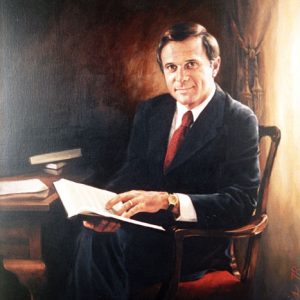calsfoundation@cals.org
Arkansas Plan
The 1976 proposal known as the “Arkansas Plan” represented an important innovation in the relationship between the state and its localities, and its defeat became one of the greatest policy failures for Governor David Pryor. At its core, the plan would have greatly expanded local control over important public policies as well as taxing authority, shifting such decision making from the state level. When the plan was introduced in October 1976, Pryor was in the midst of an easy reelection campaign. The energy that Pryor invested over the months following in a failed effort to get the plan passed became a major distraction from other aspects of his political agenda.
Pryor’s Arkansas Plan was a follow-up to a 1974 amendment to the state constitution—Amendment 55—that had transformed and modernized county governments in Arkansas. Amendment 55 had reduced the size of the county quorum courts so that they could serve as legitimate legislative bodies and had reduced the power of county judges so that they were modern chief executives sharing power with the quorum courts. Amendment 55 also gave counties “home rule” so that they could enact regulations and create new programs as long as they were not specifically proscribed by the constitution or state statute.
The Arkansas Plan would have expanded the power of counties even more and would have extended this new potency to municipalities. Specifically, they would be given dramatically enhanced power to raise their own revenues through the imposition of a variety of taxes. Pryor contended that the plan would reconnect Arkansas’s citizens with their government because those citizens would gain so much direct power over the actions of these empowered local governments. As Pryor said in the December address: “We can no longer say that we have all the answers to local problems….[T]he people know their own problems better than we know them in Little Rock. This is why state government should become a partner, and not a parent.”
However, these counties and municipalities would lose all “turnbacks,” the funds traditionally given to the local governments to be spent freely on projects. Since these expenditures would no longer exist in the state budget, and since most local governments would now be asking local voters to raise taxes, the Arkansas Plan called for a permanent one-quarter decrease in the state income tax and a bar to expanding the state sales tax during the Pryor era.
Traveling and holding town hall meetings throughout the state following the roll-out of the multifaceted plan, Pryor invested significant political capital in the program’s passage. Emphasizing the empowerment of local citizens inherent in the proposal, Pryor said at a meeting that the citizens of the state would decide whether the extra money that they received as a result of the income tax cut could be spent on raising local taxes or on “a new shotgun or coon dog.” The plan was thus nicknamed the “coon dog plan.”
The fear that local voters would make a choice against taxes (and, therefore, against services) created expansive opposition to the plan by local government officials, education advocates, and editorialists at the Arkansas Gazette. As Pryor later said, “I don’t think I had one group who were really in my corner, but it was a heck of a great fight….I didn’t feel bitter about it one bit.” Recognizing the power of the opposition, Pryor announced in late December major revisions to the plan that gutted its core principles. Thus, this grand experiment in devolution of power to the local level in Arkansas effectively died only two months after its announcement. All that survived after the legislature acted on the proposal was some enhancement in the power of quorum courts and more freedom for localities to raise a limited number of taxes for their own use. While some observers deemed the defeat of the effort a political death knell for Pryor, less than two years later, he went to Washington as Arkansas’s junior U.S. senator.
For additional information:
Kincaid, Diane. “The Arkansas Plan: Coon Dogs or Community Service?” Publius 8 (Winter 1978): 117–134.
Jay Barth
Hendrix College







Comments
No comments on this entry yet.